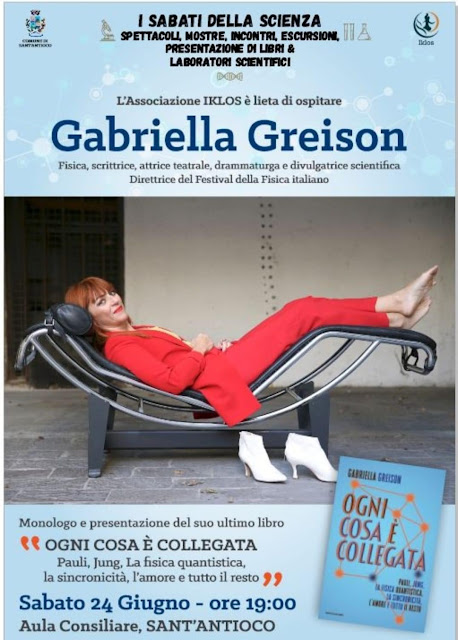Inna Kouper: Science blogs and public engagement with science: a short interview
Writing about science has changed dramatically, in the last 10 years, thanx to blogging and social media. It's very difficult to balance between perks and pitfalls and we are still tryng to orient ourselves. We start with a short interview with Inna Kouper (Indiana University).
Inna's blog: http://inkouper.blogspot.it/
 Inna Kouper wrote an article for the February 2004 issue of JCOM, the open access journal on science communication, titled: "Science blogs and public engagement with science: practices, challenges, and opportunities" and with this abstract: "Digital information and communication technologies (ICTs) are novelty
tools that can be used to facilitate broader involvement of citizens in the
discussions about science. The same tools can be used to reinforce the
traditional top-down model of science communication. Empirical investigations
of particular technologies can help to understand how these tools are used in
the dissemination of information and knowledge as well as stimulate a dialog
about better models and practices of science communication. This
study focuses on one of the ICTs that have already been adopted in science
communication, on science blogging. The findings from the analysis of eleven
blogs are presented in an attempt to understand current practices of science
blogging and to provide insight into the role of blogging in the promotion of
more interactive forms of science communication."
Inna Kouper wrote an article for the February 2004 issue of JCOM, the open access journal on science communication, titled: "Science blogs and public engagement with science: practices, challenges, and opportunities" and with this abstract: "Digital information and communication technologies (ICTs) are novelty
tools that can be used to facilitate broader involvement of citizens in the
discussions about science. The same tools can be used to reinforce the
traditional top-down model of science communication. Empirical investigations
of particular technologies can help to understand how these tools are used in
the dissemination of information and knowledge as well as stimulate a dialog
about better models and practices of science communication. This
study focuses on one of the ICTs that have already been adopted in science
communication, on science blogging. The findings from the analysis of eleven
blogs are presented in an attempt to understand current practices of science
blogging and to provide insight into the role of blogging in the promotion of
more interactive forms of science communication."
Inna Kouper, could you summarize the findings from the analysis of eleven blogs that you have presented in an article for Jcom on three years ago?
«The main findings can be summarized as follows (all concerning 2008, when the data were collected):
- Science blogs were a heterogeneous mix that was hard to characterize as a genre. I saw heterogeneity in sources for posts, topics, authors background and discursive modes of participation.
- I tried to classify modes of participation using the speech act theory and the pragmatics perspective. My catalog of modes of participation consisted of about 50 entries. I didn't see any consisted domination of particular modes across all blogs. I concluded that "Being a more fluid and personal genre of communication, blogs allow for greater variability of expression, and it seems that the authors of science blogs eagerly utilize this fluidity and variability."
- At the same time I did provide examples of several common discursive trends in posts, including reporting, explanations, evaluations. digressions, and insults. In the discussion section I pointed out that these trends may pose a challenge to the public engagement of science, rather than an opportunity.»
Do you think that these findings are stil valid today?
«My sample was small and my main finding was that science blogs are too heterogeneous. They probably still are. I was interested primarily in cataloging modes of participation so that the trends that I saw on a small scale could be verified in a later large-scale, possibly automated, analysis.
At the same time, my conclusions seemed to offend many people and my paper has generated a lot of criticism from bloggers. Some of it was interesting and fair. Some of it was rather petty or insulting, similar to what I saw in my sample. Which, in an anecdotal fashion, argues for the validity of my claims. I'm quite skeptical of the role of science blogs in public engagement of science. At the same time, there are some very good researchers-writers out there who use blogging and other informal channels of communication to advance transparency, reproducibility and meaning in research.»
Do you think to repeat this study?
«I don't think this study needs repetition. I'd be interested in doing a large-scale analysis of science blogs that takes into account my catalog, but also asks better research questions. It probably needs to be a collaborative effort.»
Andrea Mameli, Blog Linguaggio Macchina
Inna's blog: http://inkouper.blogspot.it/
 Inna Kouper wrote an article for the February 2004 issue of JCOM, the open access journal on science communication, titled: "Science blogs and public engagement with science: practices, challenges, and opportunities" and with this abstract: "Digital information and communication technologies (ICTs) are novelty
tools that can be used to facilitate broader involvement of citizens in the
discussions about science. The same tools can be used to reinforce the
traditional top-down model of science communication. Empirical investigations
of particular technologies can help to understand how these tools are used in
the dissemination of information and knowledge as well as stimulate a dialog
about better models and practices of science communication. This
study focuses on one of the ICTs that have already been adopted in science
communication, on science blogging. The findings from the analysis of eleven
blogs are presented in an attempt to understand current practices of science
blogging and to provide insight into the role of blogging in the promotion of
more interactive forms of science communication."
Inna Kouper wrote an article for the February 2004 issue of JCOM, the open access journal on science communication, titled: "Science blogs and public engagement with science: practices, challenges, and opportunities" and with this abstract: "Digital information and communication technologies (ICTs) are novelty
tools that can be used to facilitate broader involvement of citizens in the
discussions about science. The same tools can be used to reinforce the
traditional top-down model of science communication. Empirical investigations
of particular technologies can help to understand how these tools are used in
the dissemination of information and knowledge as well as stimulate a dialog
about better models and practices of science communication. This
study focuses on one of the ICTs that have already been adopted in science
communication, on science blogging. The findings from the analysis of eleven
blogs are presented in an attempt to understand current practices of science
blogging and to provide insight into the role of blogging in the promotion of
more interactive forms of science communication."Inna Kouper, could you summarize the findings from the analysis of eleven blogs that you have presented in an article for Jcom on three years ago?
«The main findings can be summarized as follows (all concerning 2008, when the data were collected):
- Science blogs were a heterogeneous mix that was hard to characterize as a genre. I saw heterogeneity in sources for posts, topics, authors background and discursive modes of participation.
- I tried to classify modes of participation using the speech act theory and the pragmatics perspective. My catalog of modes of participation consisted of about 50 entries. I didn't see any consisted domination of particular modes across all blogs. I concluded that "Being a more fluid and personal genre of communication, blogs allow for greater variability of expression, and it seems that the authors of science blogs eagerly utilize this fluidity and variability."
- At the same time I did provide examples of several common discursive trends in posts, including reporting, explanations, evaluations. digressions, and insults. In the discussion section I pointed out that these trends may pose a challenge to the public engagement of science, rather than an opportunity.»
Do you think that these findings are stil valid today?
«My sample was small and my main finding was that science blogs are too heterogeneous. They probably still are. I was interested primarily in cataloging modes of participation so that the trends that I saw on a small scale could be verified in a later large-scale, possibly automated, analysis.
At the same time, my conclusions seemed to offend many people and my paper has generated a lot of criticism from bloggers. Some of it was interesting and fair. Some of it was rather petty or insulting, similar to what I saw in my sample. Which, in an anecdotal fashion, argues for the validity of my claims. I'm quite skeptical of the role of science blogs in public engagement of science. At the same time, there are some very good researchers-writers out there who use blogging and other informal channels of communication to advance transparency, reproducibility and meaning in research.»
Do you think to repeat this study?
«I don't think this study needs repetition. I'd be interested in doing a large-scale analysis of science blogs that takes into account my catalog, but also asks better research questions. It probably needs to be a collaborative effort.»
Andrea Mameli, Blog Linguaggio Macchina



Commenti